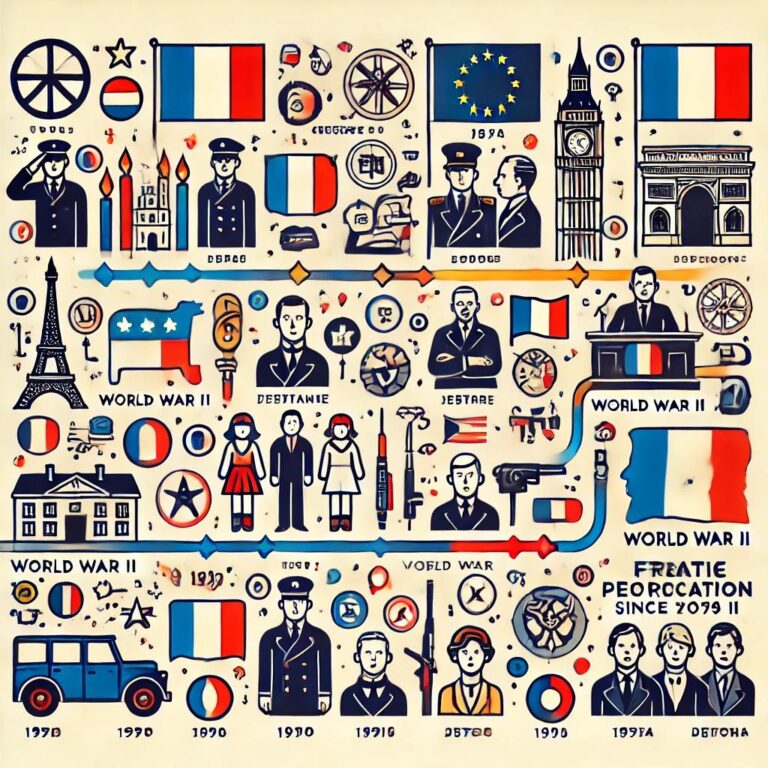
Introduction to General De Gaulle
General Charles de Gaulle stands as one of the most significant figures in modern French history. Born on November 22, 1890, in Lille, France, de Gaulle’s early years were marked by a passion for military service. He graduated from the prestigious Saint-Cyr Military Academy and rose through the ranks to become a prominent military leader. His strategic acumen and unyielding spirit were brought to the forefront during World War II, where he emerged as a symbol of French resistance against Nazi occupation.
De Gaulle’s leadership was instrumental in the formation of the Free French Forces, a movement aimed at liberating France from German control. His famous appeal of June 18, 1940, broadcast from London, rallied the French people and laid the foundation for his enduring legacy. Following the liberation of Paris in 1944, de Gaulle became the head of the Provisional Government of the French Republic, showcasing his capacity to lead in both military and political arenas.
Post-war, de Gaulle continued to shape French politics. He founded the Fifth Republic in 1958, a new constitution designed to stabilize the French political landscape. As President, his policies emphasized national sovereignty and economic modernization, which left a lasting impact on the nation. De Gaulle’s tenure was marked by a complex and often contentious relationship with the United States, reflecting his desire to assert France’s independence on the global stage.
General de Gaulle’s influence extended beyond his military and political achievements. He was a visionary who sought to redefine France’s role in the world, often challenging American dominance. Understanding his life and career provides essential context for exploring his nuanced views on American influence over France, which will be further examined in the subsequent sections of this blog post.
Historical Context: Post-War France and American Influence
In the aftermath of World War II, Europe found itself in a state of economic devastation and political instability. The continent’s infrastructure was shattered, and many nations struggled to rebuild their economies. Amidst this backdrop, the United States emerged as a dominant global power, leveraging its relatively unscathed industrial base and considerable military strength. This newfound influence was most prominently exercised through the implementation of the Marshall Plan and the establishment of the North Atlantic Treaty Organization (NATO).
The Marshall Plan, officially known as the European Recovery Program, was introduced in 1948 by U.S. Secretary of State George Marshall. It aimed to rebuild war-torn Europe, prevent the spread of Soviet communism, and foster economic cooperation. France, along with other Western European nations, received substantial financial aid under this plan, which significantly contributed to its economic recovery. However, this aid came with strings attached, as it also increased American influence over European political and economic policies.
Simultaneously, the creation of NATO in 1949 solidified American military presence in Europe. This collective defense pact was primarily designed to counter Soviet expansion and ensure security in the region. France, a founding member of NATO, benefited from the protection and military support provided by the alliance. Yet, this also meant that American strategic interests often took precedence in European security matters, further extending U.S. influence over the continent.
The dual impact of the Marshall Plan and NATO positioned the United States as a central figure in the reconstruction and defense of post-war Europe. For France, this relationship was both beneficial and complex. While American support facilitated economic revival and security, it also raised concerns about national sovereignty and dependence on U.S. policies. This context is essential to understanding General Charles de Gaulle’s perspective on American influence over France, as he navigated the fine line between cooperation and assertion of French autonomy.
De Gaulle’s Wariness of American Hegemony
General Charles de Gaulle exhibited a pronounced wariness of American influence over France, rooted in his steadfast belief in national sovereignty. His concerns were multifaceted, encompassing political, cultural, and economic dimensions. De Gaulle perceived American hegemony as a potential threat to France’s autonomy, fearing that an overreliance on the United States might erode the nation’s independent decision-making capabilities. This skepticism was particularly evident in his foreign policy and diplomatic maneuvers, where he consistently sought to counterbalance American power with a more independent French stance.
One of de Gaulle’s primary concerns was the potential for cultural dominance. He was apprehensive about the pervasive influence of American culture, which he believed could dilute French cultural identity. This was exemplified by his efforts to promote the French language and culture through various initiatives, such as the establishment of the “Francophonie” organization, aimed at fostering solidarity among French-speaking countries. De Gaulle’s cultural policies were driven by a desire to preserve France’s unique heritage in the face of what he viewed as an encroaching American cultural imperialism.
Economically, de Gaulle was wary of dependence on American financial systems and institutions. He advocated for a more self-reliant economic policy and took significant steps to reduce France’s dependence on the US dollar. In 1965, he famously called for a return to the gold standard, criticizing the dominance of the dollar in international trade and finance. This move was indicative of his broader strategy to assert France’s economic independence and diminish American economic influence.
Specific instances of de Gaulle’s skepticism towards American hegemony include his withdrawal of France from the integrated NATO military command in 1966. This decision was motivated by his desire to ensure that French military forces remained under national control, free from American directives. Additionally, de Gaulle’s opposition to Britain’s entry into the European Economic Community (EEC) was partly influenced by his concerns that Britain would act as a proxy for American interests within the organization.
France’s ‘Third Voice’ on the World Stage
General Charles de Gaulle’s apprehension towards American influence significantly shaped France’s foreign policy during his tenure. De Gaulle was determined to forge an independent path for France, distancing it from the polarized world dominated by the United States and the Soviet Union. This ambition gave rise to what is often referred to as France’s ‘Third Voice’ in international affairs, a stance that sought to establish France as a sovereign entity with a distinct perspective, rather than a subordinate ally to either superpower.
De Gaulle envisioned an independent Europe, free from the overbearing influence of the United States. He believed that true autonomy for France—and Europe at large—could only be achieved by reducing dependency on American military and economic support. This vision led to several significant diplomatic initiatives and policy decisions. For instance, de Gaulle pursued a policy of détente with the Soviet Union, aiming to balance relations between the East and the West. His state visit to the Soviet Union in 1966 exemplified this approach, where he emphasized mutual cooperation and the need for European security independent of superpower rivalry.
Another cornerstone of de Gaulle’s ‘Third Voice’ was his decision to withdraw France from the NATO military command in 1966. This move underscored his commitment to an independent defense policy, free from American hegemony. De Gaulle also promoted the idea of a “Europe from the Atlantic to the Urals,” advocating for European unity that encompassed both Western and Eastern Europe, thus reducing the continent’s reliance on American intervention.
De Gaulle’s policies often put him at odds with the U.S., but they underscored his unwavering belief in French sovereignty and his vision for a balanced and independent Europe. Through these initiatives, he sought to position France not merely as a follower of American policies but as a pivotal mediator capable of navigating the complexities of Cold War geopolitics on its terms.
De Gaulle’s Policies and Actions Against American Influence
General Charles de Gaulle, the prominent French leader, pursued a series of strategic policies aimed at reducing American influence over France. A cornerstone of his approach was the decision to withdraw France from NATO’s integrated military command in 1966. De Gaulle viewed NATO as an extension of American military hegemony in Europe, which undermined French sovereignty. By exiting the integrated command structure, France sought to regain full control over its military and foreign policy. This assertive move underscored de Gaulle’s commitment to an independent French defense policy.
Another significant component of de Gaulle’s strategy was the development of an independent nuclear deterrent, known as the Force de Frappe. Initiated in the late 1950s, this program aimed to establish France as a major nuclear power, independent of American or Soviet influence. The Force de Frappe symbolized national strength and autonomy, reinforcing France’s ability to defend itself without reliance on American nuclear capabilities. By achieving nuclear independence, de Gaulle ensured that France could pursue its own strategic interests on the global stage.
In addition to military independence, de Gaulle sought to counterbalance American power through diplomatic efforts, particularly by strengthening Franco-German relations. The Élysée Treaty of 1963, a friendship treaty between France and West Germany, was a pivotal step in this direction. The treaty aimed to foster closer political, economic, and cultural ties between the two nations, thereby creating a strong European bloc that could act as a counterweight to U.S. dominance. De Gaulle believed that a robust Franco-German partnership was essential for a balanced and multipolar world order.
Through these policies and actions, General de Gaulle endeavored to fortify France’s sovereignty and diminish American influence. His legacy in this regard highlights the enduring desire for national autonomy and strategic independence in French foreign policy.
Cultural and Economic Independence
General Charles de Gaulle’s tenure as the leader of France is marked by a fervent commitment to ensuring the nation’s cultural and economic independence from external influences, particularly the United States. De Gaulle believed that national sovereignty was deeply intertwined with cultural identity and economic autonomy. His administration took decisive steps to protect and promote French culture, recognizing the growing influence of American media and entertainment as potential threats to France’s unique cultural heritage.
One significant initiative was the implementation of policies to safeguard the French language. De Gaulle’s government launched campaigns to promote the use of French in public life and media, including the establishment of the Académie Française’s role in maintaining the purity of the language. These measures were aimed at countering the pervasive spread of English, especially in the realms of cinema, television, and music. By fostering a robust national culture, de Gaulle sought to fortify France against cultural homogenization.
On the economic front, de Gaulle pursued policies designed to achieve self-sufficiency and reduce reliance on foreign powers. This vision materialized through the nationalization of key industries, which were seen as vital to France’s strategic interests. For instance, the nationalization of the energy sector, specifically electric power and gas companies, ensured that these essential services would remain under French control, reinforcing economic independence.
Moreover, de Gaulle was a staunch advocate for technological advancement and innovation within France. His administration invested heavily in research and development, supporting homegrown technological industries. Initiatives like the development of the Concorde supersonic jet and the establishment of the French space agency, CNES, were emblematic of de Gaulle’s ambition to position France as a leader in cutting-edge technology. By fostering a culture of innovation and self-reliance, de Gaulle aimed to secure France’s economic future in a rapidly evolving global landscape.
Through these multifaceted efforts, General de Gaulle sought to ensure that France remained a sovereign nation, culturally distinct and economically robust, free from the overshadowing influence of the United States. His legacy in promoting French cultural and economic independence continues to resonate in contemporary French policy and identity.
The 6th of June Ceremony: De Gaulle’s Absence
General Charles de Gaulle’s decision to abstain from the 6th of June (D-Day) ceremony held deep symbolic and political significance. D-Day, marking the Allied invasion of Normandy in 1944, is widely celebrated as a pivotal moment in the liberation of Europe from Nazi occupation. However, de Gaulle’s absence was not an oversight but a deliberate act of political expression. His choice underscored his commitment to highlighting the role of French resistance and the liberation of France by French forces.
De Gaulle’s vision for France was intrinsically tied to the nation’s sovereignty and its identity as a major global power. By not attending the D-Day commemorations, he aimed to redirect the narrative to the contributions of the French resistance and the Free French Forces, which he led. He wanted to ensure that the sacrifices and efforts of French fighters were not overshadowed by the overarching narrative of American and Allied military prowess. This absence was a means to assert that the liberation of France was not solely an American endeavor but a collaborative effort in which French forces played a crucial role.
Furthermore, de Gaulle’s decision was also a reflection of his broader views on American influence in post-war Europe. He was wary of the growing American dominance and its potential to undermine French sovereignty. By distancing himself from the D-Day celebrations, he signaled his resistance to the idea of France being in a subordinate position to the United States. De Gaulle was determined to reestablish France as an independent and influential nation on the global stage, free from the shadow of American hegemony.
In essence, de Gaulle’s absence from the 6th of June ceremony was a strategic move to emphasize French autonomy, valorize the French resistance, and assert a nationalistic stance against external influence. It was a testament to his unwavering commitment to French sovereignty and his vision of a proud and independent France.“`html
Legacy of De Gaulle’s Stance on American Influence
General Charles de Gaulle’s perspective on American influence over France has left an indelible mark on French foreign policy and national identity. His unwavering stance on maintaining French sovereignty and independence from American hegemony has continued to resonate through generations. De Gaulle’s policies were characterized by a staunch nationalism and a desire to assert France’s position as a major power on the global stage, unaligned with either the United States or the Soviet Union during the Cold War. This approach not only solidified France’s autonomous path but also laid the groundwork for the country’s modern diplomatic strategies.
De Gaulle’s vision has had a profound and lasting influence on French foreign policy. His emphasis on strategic independence is evident in France’s contemporary international relations, where the nation often seeks to balance its alliances while safeguarding its autonomy. This is particularly observable in France’s engagement with NATO and the European Union, where it consistently advocates for European strategic autonomy and cautions against over-reliance on American leadership. The echoes of de Gaulle’s ideology are also apparent in France’s approach to international negotiations and its assertive stance on global issues.
Furthermore, de Gaulle’s legacy is intricately woven into the fabric of French national identity. His leadership during and after World War II, and his subsequent efforts to rebuild and reassert France’s global influence, have cemented his place as a symbol of resilience and independence. The national pride and sense of sovereignty that de Gaulle championed continue to shape the collective consciousness of the French people, influencing both public opinion and political discourse.
In contemporary geopolitical contexts, de Gaulle’s ideas remain relevant as nations grapple with issues of sovereignty, global power dynamics, and the balance of international influence. His leadership offers valuable lessons on the importance of strategic autonomy, the pursuit of national interests, and the complexities of navigating global alliances. As France continues to navigate its role in an increasingly multipolar world, the legacy of de Gaulle’s stance on American influence serves as a guiding principle, reminding the nation of the enduring importance of independence and self-determination.



